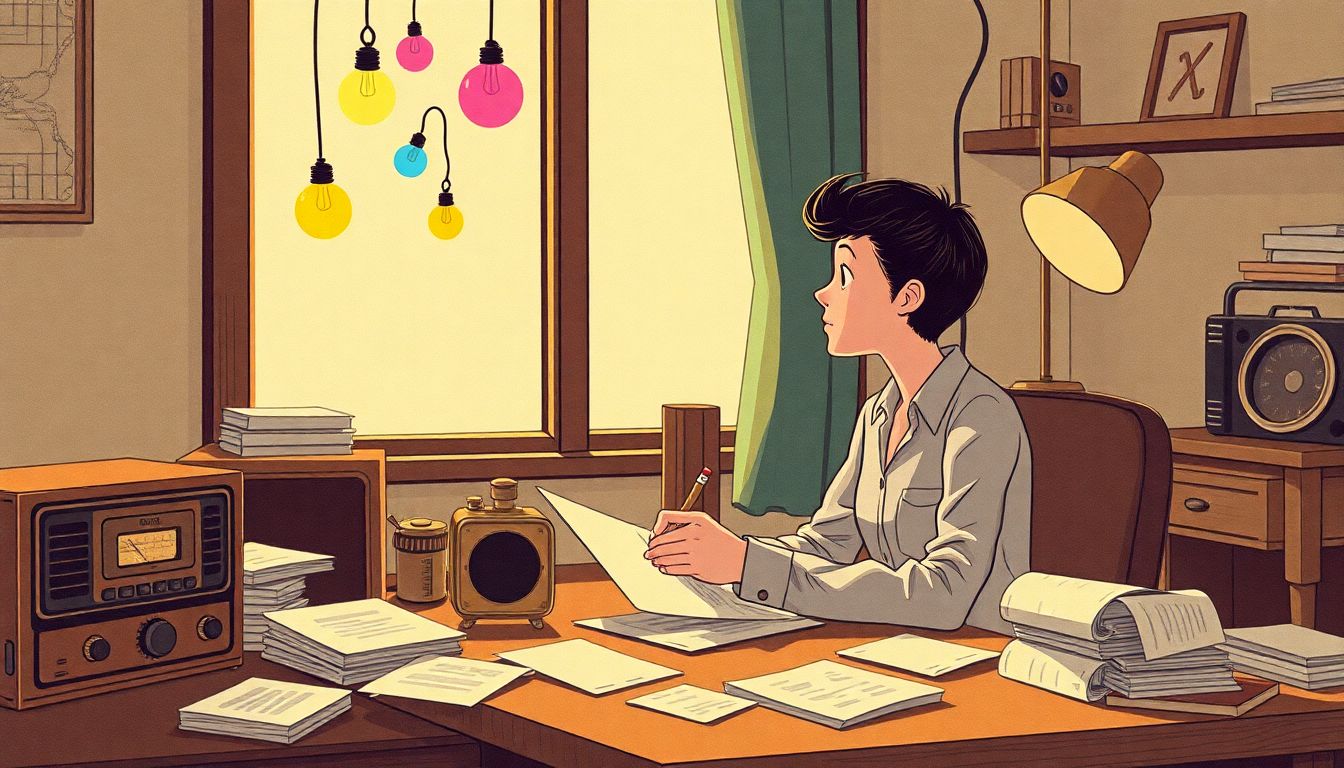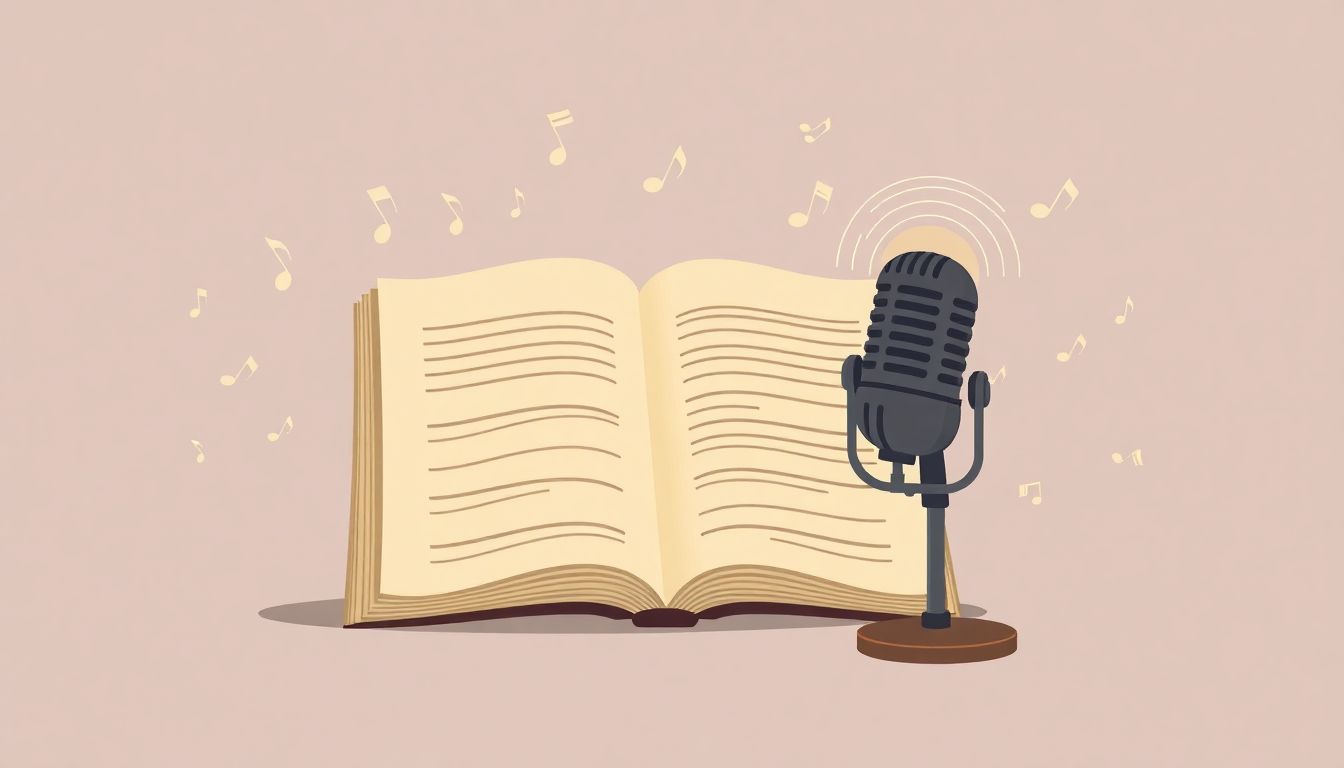Writing radio drama scripts can feel like a daunting task. You might be thinking, “How do I bring characters to life with just dialogue?” or “What if my plot sounds cliché?” You’re definitely not alone in these worries, and it’s completely normal to feel this way.
But don’t fret! If you stick around, I promise you’ll discover some fantastic prompts and tips that will spark your creativity and help you craft captivating radio dramas. With the right guidance and inspiration, you’ll soon be penning scripts that grab your listeners’ attention.
From unique character creation to sound design ideas, we’ll explore a treasure trove of resources for your radio drama writing journey. Get ready to unleash your inner playwright!
Key Takeaways
- Use prompts to spark creativity in your radio drama writing, focusing on unique plots and character development.
- Engaging dialogue is key—listen to real conversations, use subtext, and keep it concise to maintain listener interest.
- Develop unique characters with help from prompts, ensuring they have depth and relatable backgrounds.
- Structure your scripts clearly, introducing characters early and defining core conflicts to keep the audience engaged.
- Incorporate sound design thoughtfully to enhance storytelling and create an immersive experience for your listeners.

Best ChatGPT Prompts for Writing Radio Drama Scripts
Crafting a radio drama script can be both exciting and challenging, and the right prompts can help guide your creativity. Here are some effective ChatGPT prompts you can use to jumpstart your writing:
- “Generate a detailed outline for a 30-minute radio drama about a time traveler who accidentally alters history.”
- “Create a scene where two characters confront each other after years of separation, focusing on their emotional dialogue.”
- “Suggest a unique twist to a classic ghost story suitable for a radio drama format.”
- “Write an opening scene for a radio drama set in a dystopian future where music is outlawed.”
- “Outline the character arcs for a radio drama involving a detective and a deceptive informant.”
Feel free to modify these prompts to better fit your personal style or the specific themes you want to explore. The key is to use them as a springboard for your imagination.
Tips for Crafting Engaging Radio Drama Dialogues
Engaging dialogue is the heartbeat of any radio drama. Here are some key tips to consider when writing your characters’ conversations:
- Listen to Real Conversations: Pay attention to how people speak naturally. Authenticity in dialogue creates relatable characters.
- Use Subtext: Characters often have unspoken thoughts and feelings—let them reveal tension through what they don’t say.
- Keep It Concise: Since radio is an auditory medium, make every word count. Avoid overly long speeches.
- Emphasize Character Voice: Make sure each character’s dialogue fits their background and personality. This adds depth.
- Read Aloud: Hearing your dialogue out loud can help you determine its flow and naturalness—adjust as needed.
Writing compelling dialogue is crucial to keeping your audience invested in the story. Experiment and refine until it feels authentically engaging.
Using ChatGPT to Create Unique Radio Drama Characters
When it comes to radio dramas, unique characters are essential for capturing your audience’s attention. Here’s how you can use ChatGPT to help bring your ideas to life:
- “Describe a quirky sidekick for a heroic protagonist in a radio drama.”
- “Generate a backstory for an antagonist whose motivations are rooted in childhood trauma.”
- “Develop a character profile for a mysterious stranger who appears in a small town.”
- “Create a unique character who communicates through only a series of sound effects.”
- “Suggest five character traits for a leading character who is a reluctant hero.”
By using these prompts, ChatGPT can help you brainstorm character nuances that enhance your storyline and add depth to your narrative.
How to Generate Compelling Plot Ideas with ChatGPT
Generating plot ideas can feel daunting, but with ChatGPT, you can easily brainstorm intriguing concepts. Here are some effective prompts to inspire your storytelling:
- “Create a plot outline for a radio drama revolving around a double life of a seemingly ordinary person.”
- “Suggest a series of events that lead to a shocking revelation in a mystery radio drama.”
- “Generate three different endings for a suspenseful radio drama set in an isolated cabin.”
- “Outline a plot twist for a romantic radio drama that changes the dynamic between the protagonists.”
- “Describe a conflict between two rival factions in a post-apocalyptic radio drama.”
Each prompt is designed to spark your creativity and guide you to develop a compelling narrative that keeps your listeners engaged.

Structuring Your Radio Drama Scripts with ChatGPT Prompts
Structuring your script effectively is crucial for creating a captivating radio drama.
Here are some essential elements to consider when outlining your drama:
- Start with a Clear Format: Use a standard script format to ensure readability. ChatGPT can help generate a script template.
- Introduce Characters Early: Begin your script with character introductions. Ask ChatGPT to “Create a character introduction scene for a radio drama.”
- Define the Core Conflict: A central conflict keeps the audience engaged. Use the prompt, “Outline the main conflict in a radio drama about a family secret.”
- Break It Down into Acts: Consider dividing your drama into three acts. Try, “Generate an act breakdown for a radio drama involving a missing person.”
- Include Scene Transitions: Use clear scene transitions to guide listeners. Ask ChatGPT to “Suggest transition phrases between scenes in a suspense drama.”
By using these techniques, you’ll create a structured and organized script that holds your audience’s interest from beginning to end.
Examples of Prompts for Different Radio Drama Genres
Different genres of radio drama require unique storytelling approaches. Here are some genre-specific prompts to help you get started:
- Mystery: “Create a plot twist for a mystery radio drama involving a locked room.”
- Comedy: “Write a comedic exchange between two roommates arguing over a pet.”
- Horror: “Outline a chilling scene set in an abandoned asylum for a horror radio drama.”
- Romance: “Generate a dialogue between star-crossed lovers trying to find their way back to each other.”
- Science Fiction: “Describe an alien planet where emotions are forbidden in a sci-fi radio drama.”
These prompts can serve as starting points tailored to fit your chosen genre, inspiring creativity and depth in your writing.
Utilizing Sound Design Ideas in Your Radio Scripts
Sound design enhances the impact of your radio drama, creating a more immersive experience for listeners.
Here are practical tips for incorporating sound:
- Identify Key Sound Elements: Determine which sounds are crucial for storytelling. Use the prompt, “List sound effects that can enhance a tense scene in a radio drama.”
- Create a Sound Palette: Develop a cohesive collection of sounds for your drama. Ask, “Suggest sounds for establishing the mood in a romantic scene.”
- Use Sound to Build Atmosphere: Sounds can evoke emotions. Prompt ChatGPT with, “Generate ideas for background noises that create suspense in a thriller.”
- Integrate Character Sounds: Unique sounds can be linked to characters. Use the command, “Describe a signature sound for a quirky character in a comedy radio drama.”
- Test Your Sounds: Listen to how sounds flow with dialogue. Ask, “How can I balance dialogue with sound effects to maintain clarity?”
By thoughtfully integrating sound design, your radio drama will resonate more deeply with your audience.

How to Edit and Refine Radio Drama Scripts Using ChatGPT
Editing is a crucial step that can elevate your radio drama from good to great.
Start by using ChatGPT for a first round of feedback.
Try this prompt: “Review this radio drama script and suggest improvements for dialogue and pacing.”
Once you have revisions, focus on tightening your dialogue.
Use prompts like: “Identify any dialogue that feels too long or unclear in this script.”
Next, check for consistency in character voices to ensure they stay true throughout the script.
You can ask ChatGPT: “Does this dialogue match the character’s personality and background?”
After refining dialogue, pay attention to pacing and scene transitions.
Ask: “Suggest ways to improve the flow between these two scenes.”
Remember to read your script aloud or have a friend perform a read-through for fresh insights.
Editing tools and AI like ChatGPT can streamline your process and catch mistakes you might overlook.
Incorporating Settings and Atmospheres into Your Radio Drama
The setting establishes your radio drama’s world and contributes to a rich listening experience.
To create evocative atmospheres, think of specific sensory details. Start with this prompt: “Describe a bustling market street to evoke a lively atmosphere.”
You can also begin with broader settings, like: “Generate a scene description for an eerie and abandoned house.”
Use sound design to enhance these environments; prompt ChatGPT with, “List background sounds that would contribute to suspense in a thriller.”
Incorporating more than just visuals encourages listeners to immerse themselves in your story.
Always keep your descriptions concise, ensuring they enhance the story without overshadowing character development.
Consider using metaphors or similes to deepen the imagery, such as: “Compare the dark alley to a hidden sorrow.”
Common Mistakes to Avoid When Writing Radio Dramas
Avoiding common pitfalls can save you time and heartache in your scriptwriting journey.
One prevalent mistake is overwriting the dialogue. Keep it authentic and switch up repetitive phrases.
Use this prompt for ChatGPT: “Identify and suggest alternatives for repetitive dialogue in this script.”
Another issue is neglecting character development; ensure each character has a clear arc.
Try: “Outline character arcs for the main characters in this radio drama.”
Don’t forget about pacing; dragging scenes can lose listener interest.
Prompts like: “Analyze the pacing of this radio drama script and suggest improvements” can be very helpful.
Finally, be mindful of sound cues. Overusing them can distract from the story.
Ask ChatGPT: “Point out sound cues that feel excessive or redundant in this script.”
Resources for Learning More About Radio Drama Writing
Lifelong learning in writing is always beneficial, and there are plenty of resources tailored for radio drama enthusiasts.
Start with websites and platforms like BBC Writers Room or Script Magazine for articles and templates.
For structured learning, consider taking an online course. Prompt for ChatGPT: “List top online courses for writing radio drama.”
Books are invaluable; check out titles like “The Art of Radio Drama” or “Radio Drama: A Complete Guide” listed through prompts like, “Suggest books on writing radio dramas.”
Podcasts focused on audio storytelling can also be great resources. Use: “Find podcasts that discuss writing and producing radio dramas.”
Finally, engage with communities—join forums or social media groups dedicated to radio storytelling to share insights and ask questions.
Networking with fellow writers can lead to collaborative opportunities and fresh inspiration.
FAQs
Effective prompts can include asking ChatGPT to create character dialogues, suggest story arcs, or develop conflicts. Specific prompts help in generating focused and relevant responses tailored to your drama’s themes.
To improve dialogue, focus on natural speech patterns, use subtext, and create distinct voices for characters. Listening to existing radio dramas can also help you understand pacing and character interactions effectively.
Avoid overly complex plots, confusion with character motivations, and neglecting sound design. Ensure dialogues drive the story and maintain listener engagement by balancing action and exposition.
Utilize ChatGPT to review your scripts for coherence, pacing, and dialogue authenticity. Prompt the AI for alternative phrasing and plot suggestions to refine the overall quality of your radio drama.
